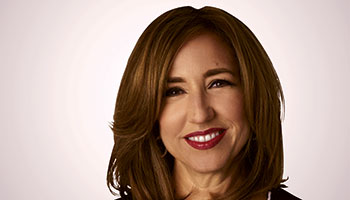Christine Duffy on her role at U.S. Travel, where crisis has brought change
Carnival Cruise Line president Christine Duffy was elected national chair of the U.S. Travel Association in February, and she leads the association’s board and executive committee. Duffy, the first cruise company president to hold the post since 2001, spoke with news editor Johanna Jainchill about how the past year is shaping the organization’s priorities.
Q: How has U.S. Travel changed over the past year?
A: We’re moving more toward being this broader organization that includes airlines — several major U.S. airlines have either recently joined U.S. Travel or are in the process of doing so. None of the Big 3 airlines were members before. We’ve got more theme park providers. U.S. Travel is really being positioned as the broader umbrella organization for the travel industry and what we call vertical associations, whether it’s CLIA, the AHLA, Airlines for America. Those associations are part of our regular briefings and updates so that we really can be more aligned, consistent and connected. Because the vertical associations focus on issues that are more specific, focused and narrow, in many cases, and often are applying defense, where we like to say U.S. Travel not only has a role to protect and defend the travel industry, but also has the ability to take a longer look out.
Q: Does it matter that some of those groups’ positions don’t always align with U.S. Travel’s?
A: Not every vertical is going to agree with everything when you get into the weeds or into some of the more tactical issues. But as U.S. Travel evolves and takes a broader view, we do see more alignment. And certainly we’ve seen that with the issues related to Covid and the impact that this pandemic has had on our entire industry.
We see that from every crisis. We saw that back in 9/11. We saw it again in 2008, where the group and meetings industry and all of those vertical associations came together. This is the piece of the expression, “Don’t let a crisis go to waste.” This crisis has brought a broader group of people that do have an aligned view on how to ensure policymakers and people appreciate and understand the impact the travel industry has in every community, the importance of inbound international travel and the importance of the cruise industry.
Q: Why are you emphasizing expanding connections with companies outside the travel space?
A: We talk a lot about the direct and also indirect economic impact with the cruise industry: If people aren’t cruising, then they’re not coming into a destination ahead of time and staying in the hotels and eating in the restaurants and experiencing places and maybe saying, “let’s come back here.”
Take it a step further — think about supply chains. All of the restaurants, which are not in the travel industry but are part of the broader hospitality industry. How many restaurants are inside of hotels? Think about business travel and group travel and the implications to the convention centers and the people that set up and build exhibits, the people doing the technology. Think about all the TVs we buy for cruise ships and for hotel rooms. So we’re really looking at the connection between travel and our big supply chains like beverages. We have Pepsi on our ships, hotels have beverages. Think about the implications when the whole hospitality travel industry stops. It’s not only direct jobs and impact. It’s all of this indirect impact. How do we engage with those indirect companies and supply chains, because they also understand the importance of a healthy travel industry in the U.S. for their own businesses.
Q: One of your areas of focus is on achieving a more diverse and inclusive industry. What is U.S. Travel doing in that regard?
A: I like to remind everyone that we have a very diverse industry. More women work in the travel industry. I think where we have work to do is to see more women and people of color and different cultures rising to leadership roles. And that will take time, but it is a big focus for all of our members. I participate in the CEO Roundtable, with CEOs of $1 billion plus companies, and we’re certainly looking to see more women and people of color at that level over time.
Source: Read Full Article




